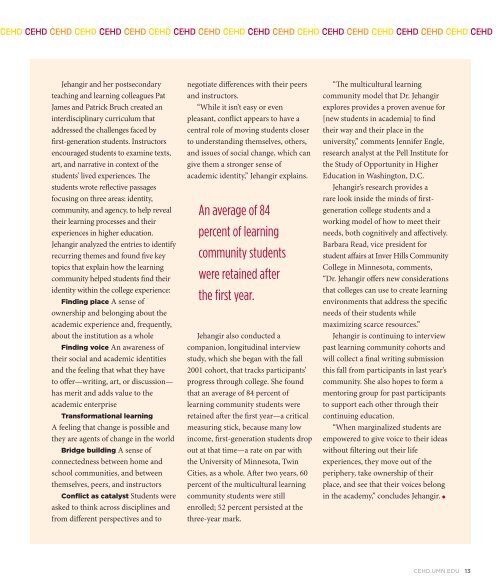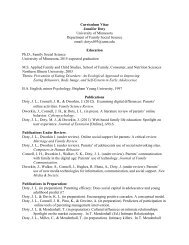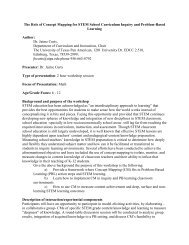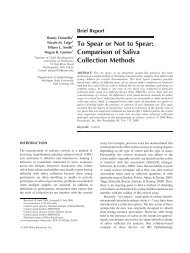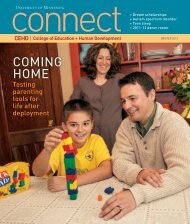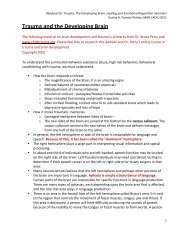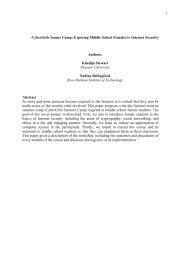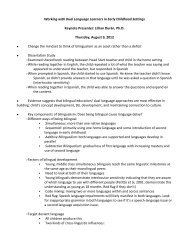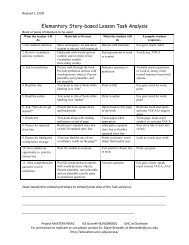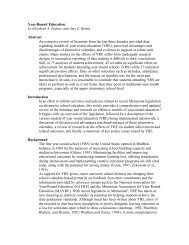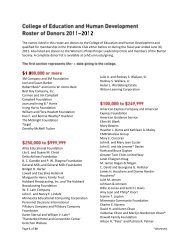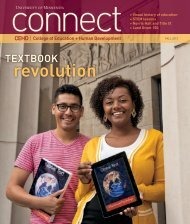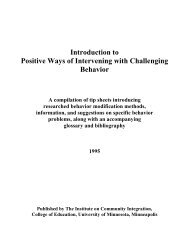connect! - College of Education & Human Development - University ...
connect! - College of Education & Human Development - University ...
connect! - College of Education & Human Development - University ...
Create successful ePaper yourself
Turn your PDF publications into a flip-book with our unique Google optimized e-Paper software.
Jehangir and her postsecondary<br />
teaching and learning colleagues Pat<br />
James and Patrick Bruch created an<br />
interdisciplinary curriculum that<br />
addressed the challenges faced by<br />
first-generation students. Instructors<br />
encouraged students to examine texts,<br />
art, and narrative in context <strong>of</strong> the<br />
students’ lived experiences. The<br />
students wrote reflective passages<br />
focusing on three areas: identity,<br />
community, and agency, to help reveal<br />
their learning processes and their<br />
experiences in higher education.<br />
Jehangir analyzed the entries to identify<br />
recurring themes and found five key<br />
topics that explain how the learning<br />
community helped students find their<br />
identity within the college experience:<br />
Finding place A sense <strong>of</strong><br />
ownership and belonging about the<br />
academic experience and, frequently,<br />
about the institution as a whole<br />
Finding voice An awareness <strong>of</strong><br />
their social and academic identities<br />
and the feeling that what they have<br />
to <strong>of</strong>fer—writing, art, or discussion—<br />
has merit and adds value to the<br />
academic enterprise<br />
Transformational learning<br />
A feeling that change is possible and<br />
they are agents <strong>of</strong> change in the world<br />
Bridge building A sense <strong>of</strong><br />
<strong>connect</strong>edness between home and<br />
school communities, and between<br />
themselves, peers, and instructors<br />
Conflict as catalyst Students were<br />
asked to think across disciplines and<br />
from different perspectives and to<br />
negotiate differences with their peers<br />
and instructors.<br />
“While it isn’t easy or even<br />
pleasant, conflict appears to have a<br />
central role <strong>of</strong> moving students closer<br />
to understanding themselves, others,<br />
and issues <strong>of</strong> social change, which can<br />
give them a stronger sense <strong>of</strong><br />
academic identity,” Jehangir explains.<br />
An average <strong>of</strong> 84<br />
percent <strong>of</strong> learning<br />
community students<br />
were retained after<br />
the first year.<br />
Jehangir also conducted a<br />
companion, longitudinal interview<br />
study, which she began with the fall<br />
2001 cohort, that tracks participants’<br />
progress through college. She found<br />
that an average <strong>of</strong> 84 percent <strong>of</strong><br />
learning community students were<br />
retained after the first year—a critical<br />
measuring stick, because many low<br />
income, first-generation students drop<br />
out at that time—a rate on par with<br />
the <strong>University</strong> <strong>of</strong> Minnesota, Twin<br />
Cities, as a whole. After two years, 60<br />
percent <strong>of</strong> the multicultural learning<br />
community students were still<br />
enrolled; 52 percent persisted at the<br />
three-year mark.<br />
“The multicultural learning<br />
community model that Dr. Jehangir<br />
explores provides a proven avenue for<br />
[new students in academia] to find<br />
their way and their place in the<br />
university,” comments Jennifer Engle,<br />
research analyst at the Pell Institute for<br />
the Study <strong>of</strong> Opportunity in Higher<br />
<strong>Education</strong> in Washington, D.C.<br />
Jehangir’s research provides a<br />
rare look inside the minds <strong>of</strong> firstgeneration<br />
college students and a<br />
working model <strong>of</strong> how to meet their<br />
needs, both cognitively and affectively.<br />
Barbara Read, vice president for<br />
student affairs at Inver Hills Community<br />
<strong>College</strong> in Minnesota, comments,<br />
“Dr. Jehangir <strong>of</strong>fers new considerations<br />
that colleges can use to create learning<br />
environments that address the specific<br />
needs <strong>of</strong> their students while<br />
maximizing scarce resources.”<br />
Jehangir is continuing to interview<br />
past learning community cohorts and<br />
will collect a final writing submission<br />
this fall from participants in last year’s<br />
community. She also hopes to form a<br />
mentoring group for past participants<br />
to support each other through their<br />
continuing education.<br />
“When marginalized students are<br />
empowered to give voice to their ideas<br />
without filtering out their life<br />
experiences, they move out <strong>of</strong> the<br />
periphery, take ownership <strong>of</strong> their<br />
place, and see that their voices belong<br />
in the academy,” concludes Jehangir. l<br />
CEHD.UMN.EDU 13


